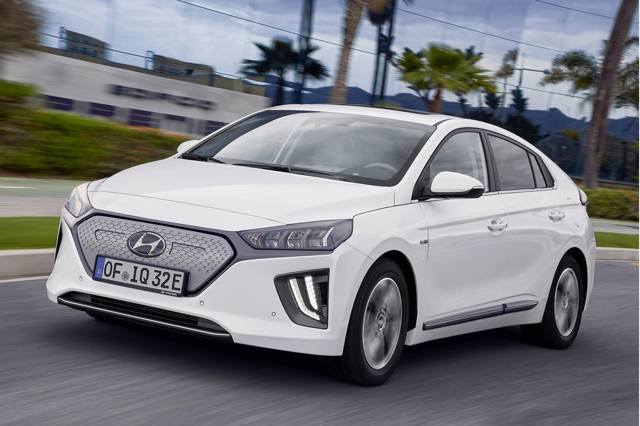Hyundai Ioniq Electric (2016 – 2022) Review
Hyundai Ioniq Electric (2016 – 2022) At A Glance
The Ioniq name is now synonymous with more exotic electric offerings such as the Hyundai Ioniq 5 and Hyundai Ioniq 6, but back in 2016 the name first appeared as a stepping stone into alternative power. Initially offered with a choice of hybrid, plug-in hybrid and pure electric powertrains, the car was designed to suit anyone and everyone, and take on established rivals such as the Toyota Prius hybrid and all-electric Nissan Leaf. Read on for our full Hyundai Ioniq Electric review.
At launch, the Hyundai Ioniq Electric was offered with a 28kWh battery, which gave an official range of 174 miles on the old NEDC test.
However, in 2019 this was upgraded with a more substantial 38.3kWh battery. Although the official range was only 182 miles, this was achieved under the more strict WLTP regulations, so real-world range improved compared with the earlier version.
Post-2019 variants of the Hyundai Ioniq Electric also benefited from a greater power output of 136PS. Torque was increased, too, with 395Nm up from 295Nm, improving overall performance.
Helpfully, the on-board charging system was also upgraded from 6.6kWh to 7.2kWh for faster charging speeds.
The driving experience is typical of an electric car from this era – low noise and low effort, with usefully rapid acceleration.
However, the modest 0-62mph time of 9.9 seconds shows that it is at its best at urban speeds, and is not as quick as some newer EVs at motorway speeds.
The handling and ride are better suited to lower speeds, too, with the extra weight of the Hyundai Ioniq Electric felt through corners. There is more body roll than in the hybrid versions.
However, the upside is that the relatively soft suspension means it is good at dealing with imperfect surfaces, with only the most significant bumps felt inside the cabin.
In contrast to some of the more outlandish EV designs out on the road, the Hyundai Ioniq Electric errs on the more conservative side.
It’s not an unattractive design, but other than the blanked-out front grille, it doesn’t really provide many clues that it is an EV. For some buyers, that will be an appealing factor.
Inside, the Hyundai Ioniq Electric offers a sensible layout that is not without some design flair, although the later versions from 2019 onwards are better in this respect.
Unlike the more unusual Toyota Prius dashboard, the Hyundai Ioniq Electric has a conventional layout with a central touchscreen, and all the controls are where you would expect to find them.
In quality terms, it is also impressive, with few hard surfaces and an overall sense of robustness.
Interior space is also good in general, although it is worth bearing in mind that the Hyundai Ioniq Electric has slightly less boot space than the hybrid and plug-in hybrid versions.
Additionally, the shape of the roofline means that headroom in the rear is slightly reduced, which may be an issue if carrying adults in the rear is a regular occurrence.
Overall, the Hyundai Ioniq Electric offers a non-threatening and easy-to-use EV experience, which for many buyers is exactly what is required.
The driving experience is far from thrilling, but with Hyundai’s good reputation for reliability, it should provide a satisfying car to own.









 Easy-going nature. Good interior quality. Smooth electric powertrain.
Easy-going nature. Good interior quality. Smooth electric powertrain.
 Compromised rear space. Modest performance.
Compromised rear space. Modest performance.
.jpg?width=240&height=160&rmode=crop)

.jpg?width=240&height=160&rmode=crop)






 What is your car like to live with?
What is your car like to live with?